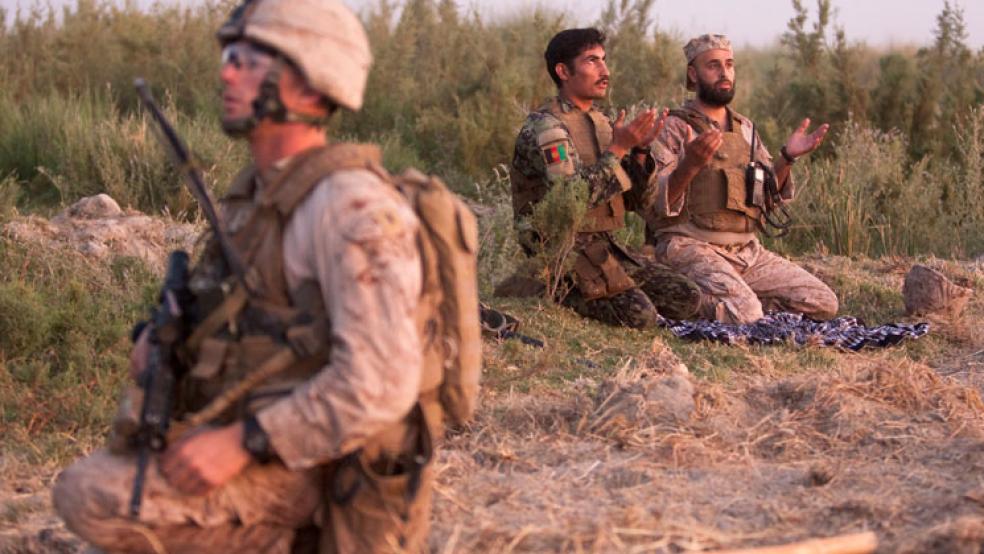The U.S.-led coalition in Afghanistan apologized Friday for mistakenly killing a 2-year-old boy during an airstrike, the latest crisis to confront American officials hoping to finalize a long-term security agreement between the two countries.
Late Thursday, Karzai had blasted the U.S. military for the death and accused coalition troops serving in Afghanistan of “oppressions.” Within hours, U.S. and coalition military leaders were rushing to try to control the fallout of the strike, which also wounded two women.
Related: Obama's Security Deal Gives Karzai a Blank Check
Marine Gen. Joseph F. Dunford Jr., commander of U.S. and coalition forces in Afghanistan, called Karzai to apologize personally. The international coalition also issued a statement saying it “deeply regrets” the incident.
The civilian casualties couldn’t have come at a worse time for U.S. diplomats, who have watched with dismay over the past week as Karzai appeared increasingly dismissive of administration plans to keep up to 10,000 U.S. soldiers in Afghanistan after 2014.
In a series of public statements, Karzai has insisted he may wait until next year to decide on the matter, even though the administration is urging him to sign the agreement by the end of year. If he does not, administration officials say, they will begin preparations for withdrawing all U.S. forces from Afghanistan by the end of next year.
The death of the child further complicates the already strained relationship, giving Karzai yet more grounds to cite in his quest for concessions.
Aimal Faizi, a Karzai spokesman, said Friday evening the agreement will be signed only after there is an “absolute end to all military operations and airstrikes on residential areas by foreign troops which can result in civilian casualties.”
He added, “Apologies cannot bring back lives.”
Related: Vietnam's Harsh Lessons About U.S. Troop Withdrawal
Karzai said a suspected U.S. drone fired into a house shortly before noon Thursday in the southern province of Helmand. The coalition acknowledged the incident Friday morning, saying that a child was apparently killed during an operation targeting “an insurgent riding a motorbike.”
A senior coalition official said the child was on the road when the explosion occurred and denied Karzai’s claim that a house had been targeted.
The intended target, who was also killed, was a “mid-level Taliban commander who had been involved in attacks” on coalition troops and was “organizing and facilitating lethal aid to insurgents in the area,” said the official, who spoke on the condition of anonymity under coalition ground rules. Coalition officials declined to say whether the strike was carried out by a drone or a manned aircraft.
During his call to Karzai, Dunford promised to launch an immediate investigation. But the governor of Helmand and other local officials denounced the attack, saying it was just one of two coalition strikes in the province Thursday that had resulted in a civilian death.
Abdul Bari Barakzai, head of the Helmand provincial council, said a “farmer in a field” was also killed by a suspected U.S. drone strike Thursday. “These attacks will have a very bad impact on the signing” of the agreement, Barakzai said. “People nationally will rise up and say, ‘We expect [U.S. forces] to protect us from our neighbors, but instead you are bombing and killing us.’ ”
A coalition official confirmed that a second “precision strike” had taken place in the area but said it killed an “insurgent.” “There were no other casualties,” the official said.
A spokesman for the U.S. Embassy in Kabul declined to comment, and there was no immediate reaction Friday from the State Department or the White House.
Even before Thursday’s airstrikes, however, the administration had been struggling to persuade Karzai to quickly sign the agreement authorizing U.S. forces to remain in Afghanistan after 2014 to help train and advise the Afghan military. Karzai has been seeking to reopen negotiations with the administration, saying he needs additional assurances that the United States will not meddle in Afghan elections next year, will cease military raids on Afghan homes and will help start peace talks between Karzai’s government and Taliban insurgents.
To facilitate the talks, he has demanded that the United States release 17 Afghan prisoners from the U.S. detention center at Guantanamo Bay, Cuba. Now, Karzai has added a reduction of U.S. airstrikes to his list of demands.
In some ways, Thursday’s strikes appeared to come as a direct challenge to Karzai. Starting Sunday and continuing throughout the first part of the week, Karzai or his spokesman had repeatedly stressed that the agreement would not be signed so long as raids on Afghan homes or civilian casualties continued.
“For years, our innocent people have become victims of the war under the name of terrorism, and they have had no safety in their homes,” Karzai said Thursday.
But observers say Karzai’s growing demands concerning U.S. military behavior could soon force commanders to reconsider their post-2014 mission. As part of the security agreement, which allows for a total of 15,000 foreign troops to remain in Afghanistan, the U.S. military also plans to conduct a limited number of counter-terrorism missions in the country.
“If he represents what the majority of Afghans want, it’s going to be hard to maintain those kind of missions,” said Robert G. Loftis, a professor at Boston University and a former diplomat who led the George W. Bush administration’s initial effort to reach a status of forces agreement with Iraq in 2008. “He’s playing a dangerous game here, and he may convince, if not the [Obama] administration, the American public, ‘Hey, why are we doing this’?”
Sayed Salahuddin contributed to this report, which originally appeared in The Washington Post.
Read more in The Washington Post:
Why Did China Impose An Air Defense Zone Likely to Fail?
China Sends Fighters to ID Flights by U.S. and Japan
Outside D.C., Democrats Lead Pushes for Minimum Wage Hikes






